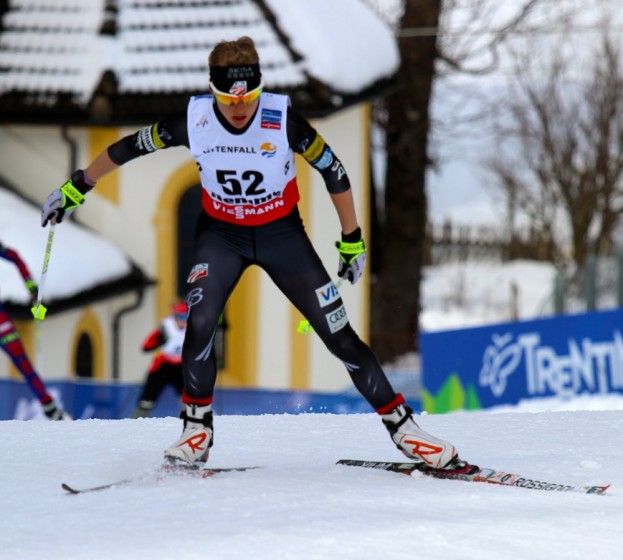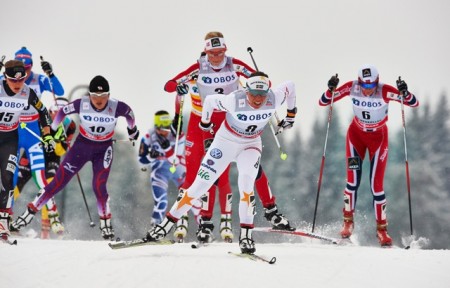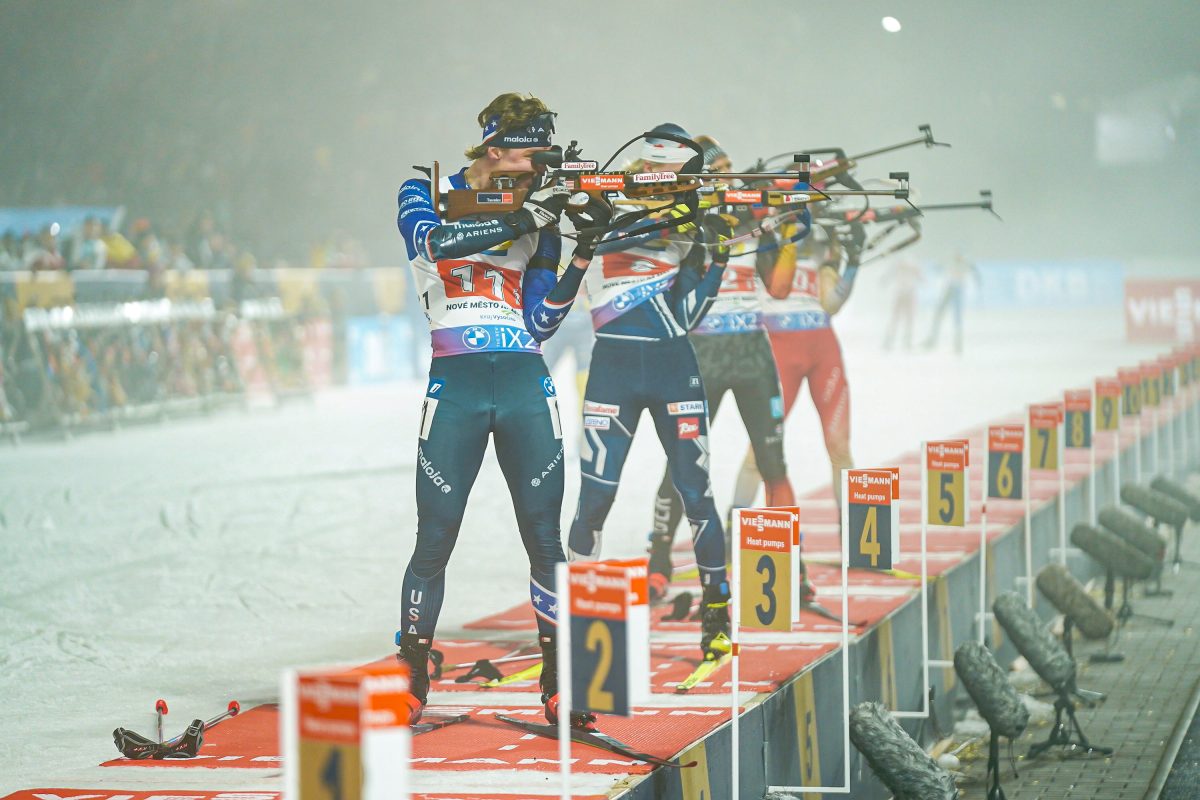
Liz Stephen has hit many career-making milestones this season. Her first top-five at World Championships came only weeks ago, and before that she reached the top-ten for the first time in a pre-Olympic skiathlon in Sochi, Russia. In a sport with two techniques and many formats there are multiple ways to measure progress, but on Sunday in Oslo, Norway, the 26-year-old hit a big one: a top-ten in a 30 k mass start freestyle, the longest race women see on the World Cup.
The numbers that describe this performance on paper— ninth place, 57 World Cup points, a 1:22:41.6 finishing time — don’t tell the whole story of Stephen’s most recent breakthrough, however. Stephen skied comfortably within the group chasing Therese Johaug’s (NOR) breakaway for all but the final 2.5 k, and it was time she spent in that pack that was one of her biggest takeaways and measures of progress from the race.
“I’m of course really happy with the ninth, but it was really fun to do today,” Stephen said. “It’s like I’ve never been skiing in the chase pack for virtually the whole race like I was today. It just makes the race so much more fun and so much more doable. That 30 k in Val di Fiemme was classic, which is always harder for me, and that race felt so long and so lonely and hard. And today was just the opposite. I couldn’t believe we’d already done three laps, I couldn’t believe we were already coming into the finish — it was just a really fun and exciting race to do.”
It was Stephen’s unusually high positioning at the front of the chase group that might have actually prevented her from turning a top-ten into something more, which added another dimension to her thoughts on the result.
The race included a noteworthy new time penalty in the ski pit, with the addition of a few extra meters leading up to it. This punishment for changing skis midway through the race forced athletes to decide whether faster wax was worth the half-minute it took to ski the penalty and put skis on.
As it turned out, Stephen’s race ended up being somewhat of a case study in how 0-for-3 exchanges stacked up against other permutations. Nobody in the lead group chose to change skis after the first lap, but the second opportunity turned into a race-defining moment. Johaug, skiing a minute off the front, made the decision to switch with seconds to spare, and though there was little chance anyone would catch the Norwegian, the choice wasn’t as straightforward for the women fighting for second and third behind her.

For Stephen, who found herself leading the chase group at the intersection, it was a particularly confounding choice: she had to make the decision blindly, with no knowledge of what the women on her tails would do.
When the fork faced her, she went with the instinct to turn back out to the course on the skis she was already wearing, which were still fast at the time. It was not a situation Stephen had expected to find herself in, but she had to make a decision.
“I led that chase pack into the stadium and was not planning on doing that,” Stephen explained. “I was just going to do whatever the pack did, but my skis were running well at that point so I decided: I’m just going to go for it. And so I went for it and it turned out most of the pack, with a few exceptions, changed.”
Out of the ten women that followed Stephen into the stadium only three others made the same choice not to switch skis: Kristin Størmer Steira (NOR), Nicole Fessel (GER) and Anouk Picon (FRA). As the other seven women stepped into a fresh pair, Stephen led the newly formed four-person chase group out of the stadium for the third and fourth laps.
There’s no telling what might have happened if Stephen had chosen to go the other way at the fork, or if she had instead been sitting within the pack and been able to observe her competition’s choice. But there was no going back at that point, and for the remaining 17 k Stephen drove the pace of her group as the next one closed in behind them on fresh skis.
“We held them off for 6.5 k of the big loop, but they caught us by the next loop and then it’s kind of too late to change at that point,” Stephen said. “They’re not going to change again with only 8 k to go, so Kristin and I were kind of stuck. We couldn’t change because we’d lose the pack and then it’d be over. So we just kind of went and you know, the skis were definitely slower.”
Stephen and Steira stayed out of the exchange zone before their last lap, but Fessel made the gamble and broke off alone for a new pair. The remaining 8 k were lonely ones for Fessel, but she had skis that nearly brought her back to the group she’d been with by the end. Stephen and Steira, by contrast, felt their skis working against them as the kilometers slipped by and they struggled to remain in contention with Justyna Kowalczyk (POL), Yulia Tchekaleva (RUS), Heidi Weng (NOR) and Masako Ishida (JPN), all of whom had faster, newer skis.
“For me, mentally, I had to stay with the pack,” Stephen said of her decision to skip the third exchange.
Her skis gradually slowed down. Stephen fought against the handicap until about 2.5 k to go, when a large downhill quickly separated the women on new skis from the ones on slower pairs. With Kowalcyzk hammering off the front the strung-out pack slipped away from her, and on top of that a resurgent Charlotte Kalla (SWE) and Astrid Jacobsen (NOR) caught Stephen from behind in the last few kilometers.
Stephen finished 1:23.9 minutes behind Johaug’s winning time of 1:21.17.1, and 37.7 seconds behind Kowalczyk’s second-place mark. Steira, Stephen’s partner in the zero-exchange decision, finished seventh, 6.9 seconds ahead of her.
“It was a little bit frustrating that way, but at the same time you take a chance and you try something to see if it will work,” Stephen said. “Sometimes it does and sometimes it doesn’t. I’m happy with today, but I’m also kicking myself a little bit because I think it could have gone a bit better had I made a slightly different tactical decision. Now I know, and I probably will change in the future. It was fun to try something new and who knows: maybe someday it will work.”
U.S. Ski Team coach Matt Whitcomb surmised that Stephen demonstrated “podium-material stuff” on Sunday apart from the fact that the ski exchanges didn’t work out for her.
“And it’s not Liz that played them wrong, it’s kind of a group effort,” he emphasized. “She ended up not exchanging her skis and paid the price for that, as did the three other girls that she packed up with at 13 k. In hindsight we would have changed skis at 13 k and skied those into the finish, but it’s tough when you’re in an opportunity to move into second place… And it looked like it was going to work, but those skis just kept slowing down.”
For Stephen and for many other athletes the new time-punishment for changing skis was undoubtedly a race-defining element. With the test run for the feature now out of the way, athletes and coaches had mixed feelings about it. Stephen and Whitcomb were each against it to some degree.
“I guess I’m not a huge fan of the ski exchange with the penalty just because it’s an element that has not been a part of ski racing, ever,” Stephen said. “It’s like a guaranteed 30 seconds of penalty and yeah you have faster skis, but I don’t know. Watching the guy’s race it made it really confusing for me… I think they’ll probably keep it in because I think it’s probably exciting for spectators, but we’ll see.”
Whitcomb observed that, at least in the women’s race, athletes generally weren’t able to come into the exchange area with a concrete strategy already laid out.
“It certainly does add some strategic value, there is that, but it just made it a little too complicated,” he said. “You didn’t see a whole lot of girls out there with a great plan, they’re kind of frantically yelling to their coach, ‘What should I do?’ 100 meters before they go to the intersection. I don’t know. It’s not a strong opinion, I just don’t think [exchanges] are great for skating. I think they’re pretty cool for classic.”
Whitcomb did admit this opinion was somewhat biased — “I’m obviously making that statement after having just been burnt by it,” he said.
The entertainment value of the new feature was undeniably high — TV commentators spent minutes talking about the tradeoffs of each choice while skiers had the same conversation with themselves. You just read over 1,000 words discussing how the rule change affected one woman’s race. Time will tell whether International Ski Federation will decide to keep the rule for future events, but Stephen and several other U.S. athletes had a hunch they would see the format again in the future.
Even though the feature may have demoted a potential top-five to a top-ten for Stephen, ninth is still a new high water mark for the American in the long distance. Additionally, the 57 World Cup points she picked up on Sunday between the sprint preems and the overall result propelled her into 18th in the overall standings headed into the last four races of the season in Stockholm and Falun, Sweden, next week.
“That’s cool, because when you show up next year and you’re in the top 30 overall you get a name bib,” Stephen said happily. “I’ve never had a name bib and I barely made the top 50 last year, so it’s a big step up that way. It’s fun to see progress and I’ve certainly had an awesome season, and I’m looking forward to next year and looking forward to Falun, for sure.”
Audrey Mangan
Audrey Mangan (@audreymangan) is an Associate Editor at FasterSkier and lives in Colorado. She learned to love skiing at home in Western New York.




2 comments
nyctvt
March 18, 2013 at 9:56 am
Congratulations Liz. Go Vermont!
highstream
March 18, 2013 at 12:21 pm
Nice race for Liz. Hope this gets her up to closer on the distance relay team. As for the ski change penalty, it seems like a gimmick looking for a justification. Seems sort of school marmish, with skiers are being punshed for spite, not having done anything wrong. In fact, the whole exchange business ought to be looked at. Amazing how the top marathoners manage without it, carrying their own kick wax if worse comes to worse.